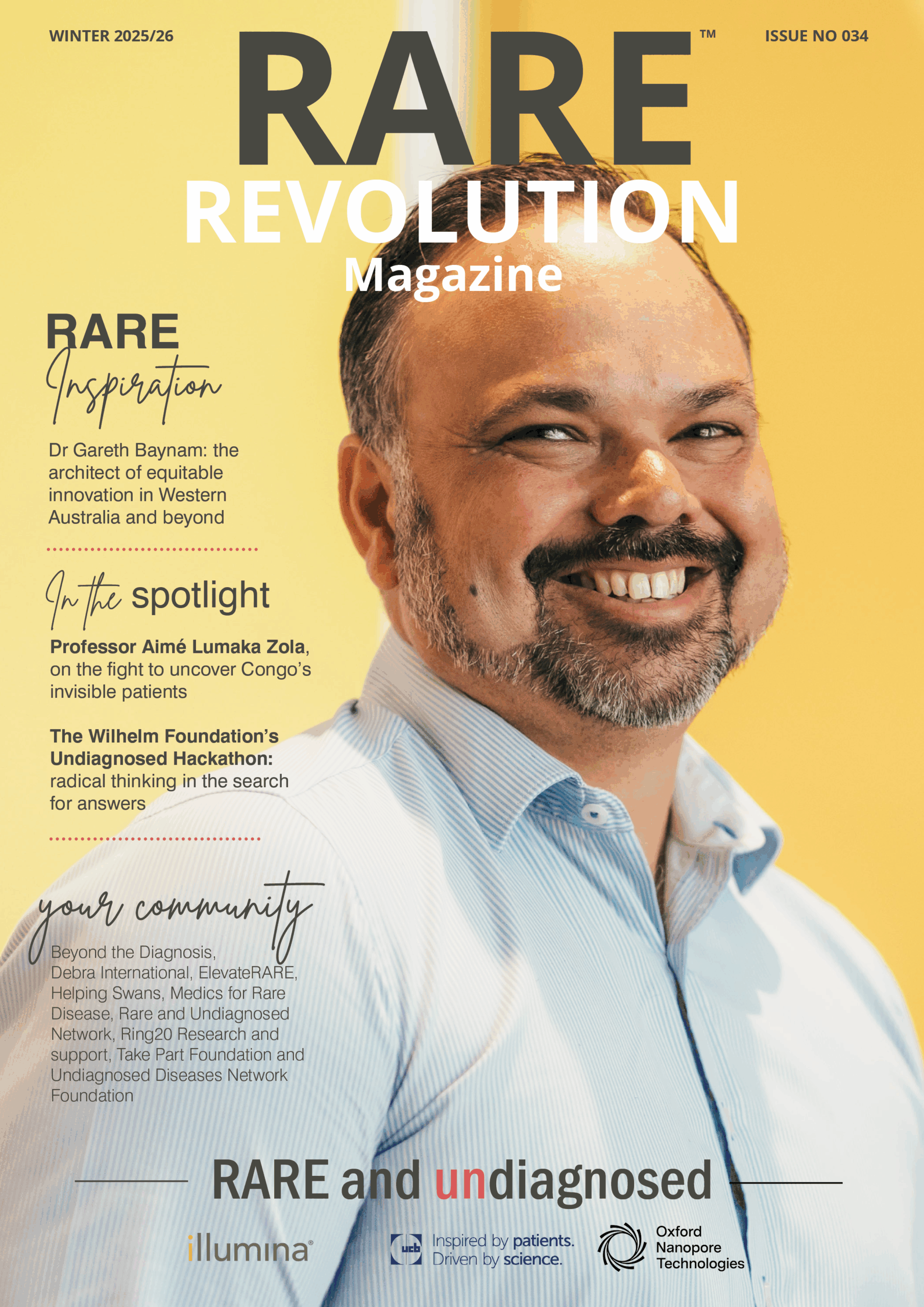Resilience in the face of a rare and uncertain diagnosis
SPONSORED CONTENT

Having lived with a form of kidney disease for most her life, Margaret has approached her new rare diagnosis head-on and deals with the daily challenges as they present themselves. From finding the right specialists to managing the physical, financial and lifestyle impacts, her story highlights the complexities of living with a little-known disease (C3G) and the resilience required to overcome the obstacles
Written by Emma Bishop
Interview with Margaret Kim
Margaret was initially diagnosed with the kidney disease, IgA nephropathy, 30 years ago. At the time, she was very unwell and exhibiting clear symptoms of kidney involvement, such as haematuria, which is the presence of blood in the urine. She underwent a biopsy which indicated IgA nephropathy. Margaret was treated with medication and regular monitoring over the course of the next 10 years. With her condition remaining relatively stable, she was cleared to stop taking medication and eventually became less diligent about attending nephrology appointments.
In the summer of 2024, while on a cruise, Margaret began experiencing an episode of haematuria again, alongside extreme lethargy. She initially attributed her symptoms to her menstrual cycle and possible motion sickness but when she returned home symptoms remained, indicating this to be something more. “The symptoms not only continued, but my legs were completely swollen (edema). I couldn’t even fit into some of my shoes. I was waddling around because I couldn’t bend my feet.”
Margaret consulted with her general practitioner (GP) who, upon discovering elevated protein and creatinine levels in her blood, referred her to her nephrologist. Her array of symptoms was not typically suggestive of her previous diagnosis of IgA nephropathy and a further biopsy suggested a new diagnosis of the rare kidney disease, complement 3 glomerulopathy (C3G). However, such is the rarity and the imprecision of the diagnostic criteria, that even now, there remains some uncertainty around whether Margaret has confirmed chronic C3G, or a condition called post-infectious glomerulonephritis (PIGN). While doctors work to determine the exact nature of her kidney disease and the appropriate treatment plan, Margaret is living with continued uncertainty and doubt.

Margaret says it has been challenging to navigate the healthcare system and establish consistent coordination of care for her rare disease. She has found it difficult to access the necessary expertise because her condition is relatively unknown and has described “going back and forth” between different medical professionals. It has prompted her, at times, to conduct her own research and consult with specialists outside of her immediate healthcare setting for additional reassurance.
Managing a medical condition can feel like the role of an office administrator with the number of appointments, scheduling and administration to manage. Margaret notes that keeping track of all her medical appointments, test results, medications and medical bills presents a significant drain on her time and energy.
“The medical bills can arrive weeks or even months later so it can be a real challenge to match them up and reconcile them, especially when you may have had 10 different lab tests since then. It is a lot to stay on top of.”
Margaret also notes that she has multiple portals and digital apps to manage her care, all under the same healthcare setting, which adds a strain on her time. “Dealing with a medical condition can feel like a full-time job in itself.” The frequent appointments and tests, alongside time taken off work, and travel to medical appointments, has caused additional financial burden and stress for Margaret.

The onset of Margaret’s symptoms coincided with the start of a new job, adding a further layer of pressure and anxiety. Margaret has had to balance her medical needs whilst striving to make a good impression with her new employer and colleagues. “I definitely feel I need to prove myself because I’m new and already having to take time off,” shares Margaret. She notes that her new employer has been very accommodating, allowing her the flexibility to attend frequent doctors’ appointments to manage her condition—which is currently at least once a week. Despite this, Margaret’s diligence means she still feels a sense of pressure to prove herself and is concerned about the impact this may have on her performance and ability to integrate into the company. She admits that she will work late into the day to make up time, but this presents an additional burden.
“I feel a real pressure as I have kids who also need me. I feel like I’m constantly being pulled in different directions.”


When first diagnosed, Margaret was advised to follow a low sodium, low potassium diet but says the dietary restrictions have proved challenging because of a lack of resources and guidance. “I was given this big printout from the nephrologist, of low potassium food—things to avoid, things to have in moderation and things to eat more of. Everything in the column of foods to eat more of were things like plain white rice, white toast, and really starchy, heavy foods that don’t seem like healthy options. And everything in the other column were foods like kale, avocados, and fruits and vegetables. It felt like the advice was in conflict—I’m supposed to lose weight whilst eating these unhealthier options.” The advice was not immediately intuitive and went against what Margaret understood to be healthy eating, requiring a shift in her mindset around food. Margaret is also not allowed to drink alcohol as even a few sips of wine cause her to faint. While not a big drinker, Margaret admits to missing the social aspects of drinking with friends and colleagues.
Margaret suffers with high blood pressure and cholesterol as a result of her condition, which is managed with medication and lifestyle. “Overall, I’m trying to be healthier, doing more cardio and trying to eat healthier.” She has been treated with steroids and immunosuppressants, the latter of which had a significant impact on Margaret’s life as they compromise the immune system, meaning she was required to wear a mask when she travelled or in large meetings at work. For now, a decision has been made to stop the immunosuppressants, while doctors continue to trial different treatment options to discover the precise nature of her condition.
Despite the physical symptoms caused by Margaret’s condition, she says she feels very fortunate, particularly when meeting other people with her condition and seeing their disease progression.
“The scariest thing I have had was the intense swelling and fatigue. But I have met a lot of people whose situation deteriorated very quickly, and they needed to go on dialysis or get a (kidney) transfer (transplant). Also, many people I’ve connected with are parents of young children. I have two young boys myself and so I feel it’s a lot easier for me to deal with this than if it were my child. It gives me a good perspective when looking at my own condition.”

Margaret remains resilient when facing down adversity and the daily challenges of her disease. She says when she was first diagnosed with C3G, it was her husband Jay who acutely felt the emotional and mental burden, with concern over the long-term prognosis and effects of the disease. As she explains, “He was more stressed out than me and so worried when reading the statistics. I’m more of the opinion, ‘we don’t know what it is, we’ll tackle it when we get there.’” Margaret says support groups, such as the C3G Warriors Facebook group, have been a big support to her and Jay. She acknowledges the importance of patient support groups in providing a sense of community and valuable advice and resources.
Having received the diagnosis of C3G just four months ago, Margaret recognises that she hasn’t had time to fully process her diagnosis, and that her focus has been on her busy career and family life. “Before this, I was working remotely, and now I’m working in-person, so that’s been a huge lifestyle change for my family, juggling the school runs, with me going into the office.” She also feels that because she has lived with kidney disease in some form for most of her life, she is well-versed in coping with these new challenges and burdens. She says her main concern and biggest stressor right now is uncovering the exact nature of her condition while a question mark hangs over her current diagnosis.
Margaret’s journey with the rare kidney condition C3G has been marked by uncertainty, varied challenges and significant financial and lifestyle impacts. Transitioning from a stable IgA nephropathy diagnosis to this new, unfamiliar disease has required Margaret to advocate for specialised care, manage frequent medical appointments and adapt her diet and daily routines. Her pragmatic approach puts her in good stead for managing the many challenges rare brings and her story highlights how the impact of rare can percolate through every aspect of life both personal and professional, and the additional strain the logistics place on families.
Articles within this digital spotlight are for information only and do not form the basis of medical advice. Individuals should always seek the guidance of their medical team before making changes to their treatment.
This digital spotlight has been made possible with sponsorship from Apellis Pharmaceuticals, Inc. The Apellis name and logo are registered trademarks of Apellis Pharmaceuticals, Inc. All opinions are those of the contributor. RARE Revolution Magazine retains all copyright.












